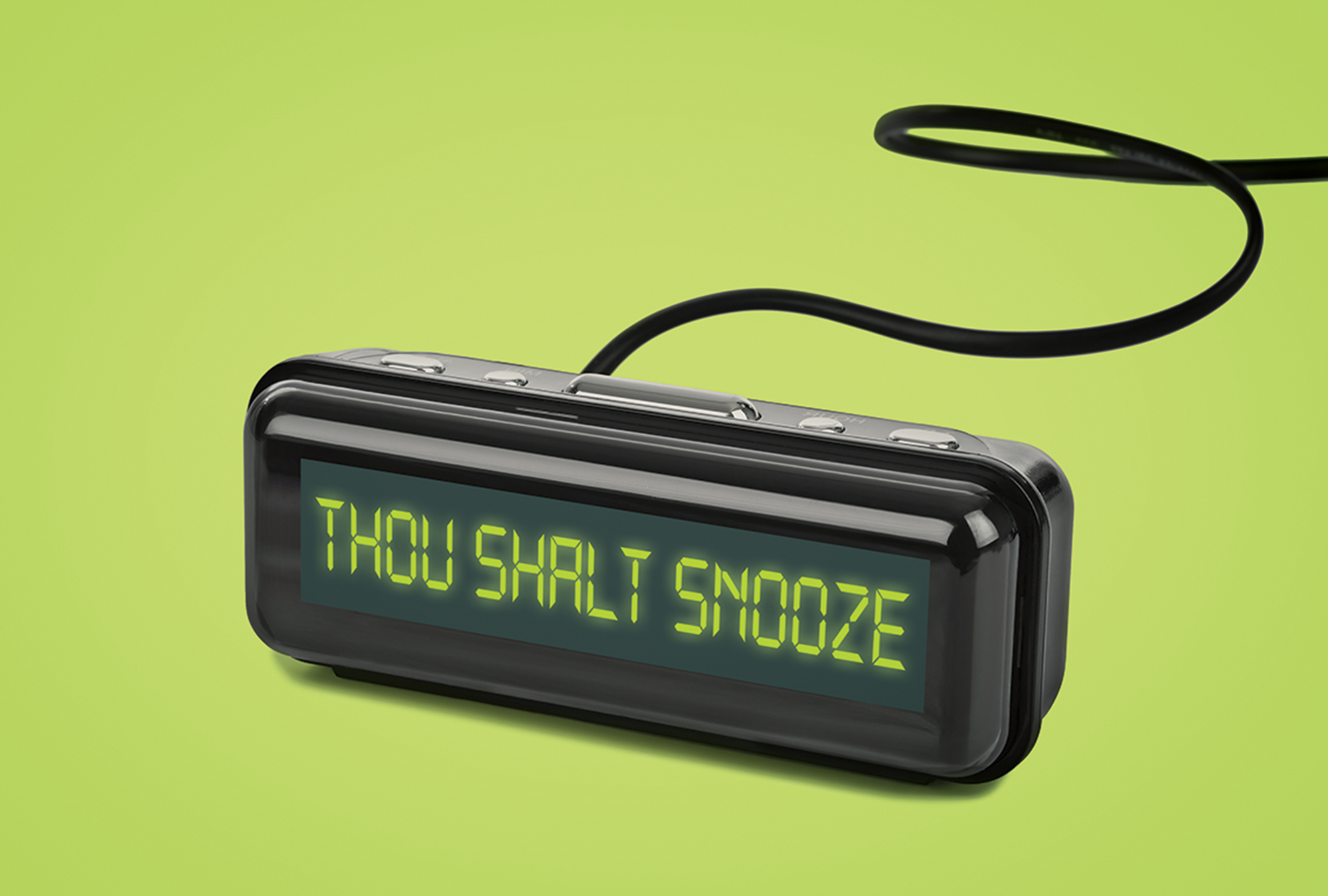
Illustration by Matt Chase
We Need Sabbath. In the U.S., We Don’t Trust Each Other Enough to Take It
IN MARCH LAST YEAR, as I was leaving a medical appointment, a nurse handed me a small, leopard-print cosmetic case with a pink ribbon attached. “A gift from us.”
This is not the kind of gift one wants to receive. I had been diagnosed with breast cancer. It was a welcome-and-sympathy gift wrapped up in one. With two young children distance-learning at home, I had considered a wide range of maladies our family might encounter—from “Zoom fatigue” to learning loss to the coronavirus itself. But not cancer.
My unpreparedness for major illness meant that I had no primary care physician, no relationship with any of the major health systems in my area, and no access to paid leave.
All this despite the fact that I was a professional advocate for family-leave policies. During the last several years, nearly all my working hours were spent researching, writing about, and promoting more humane work and family policies. I have often made this case to employers and legislators: All workers, at some point in their lives, will experience illness, frailty, or the need to care for someone else. It is wiser to anticipate and honor this aspect of humanity than to ignore it.
Now, the human in question is me.
I had not prepared for an illness requiring rest and extensive treatment. Work—both that for which I earn a living and all that goes into raising children and managing a household—played a defining role in structuring my days. Needing to not work was barely imaginable.
Learning about the Sabbath was part of my childhood catechesis in the Lutheran tradition. But the biblical commandment to “remember the Sabbath day by keeping it holy” was presented as a personal exhortation to attend church each Sunday, rather than a practice that might transform the relationship between people and work.
Married to the job?
IN THE UNITED STATES, we are a nation accustomed to working “in sickness and in health,” more reflective of marriage vows than a labor contract. Americans work more hours, on average, than do workers in most other industrialized nations. There is evidence that today’s families devote more time to work than families a generation ago did. Economist Isabel V. Sawhill and researcher Katherine Guyot estimate that average middle-class married parents in the U.S. now work, collectively, 600 more hours per year than did a comparable couple in 1975—that’s two and a half months more.
Work is not only about volume but also about trade-offs. The dominant role work plays in U.S. culture and life reveals itself not only in the quantity of hours worked but when those hours occur and how those work hours interfere with other aspects of life. At least 20 percent of new mothers—more than 700,000 women each year—return to work just a few weeks after giving birth to a child. Three million Americans work while sick each week. At the precise moment that many Americans would like to be tending a new baby or recovering from a cold, they are working.
During this coronavirus pandemic, the high stakes associated with work became devastatingly clear. Early in the pandemic, there were reports of food processing plants with strict attendance policies where hundreds of workers got sick, and some died. Parents who were fortunate enough to work from home multitasked like never before. Parents and other family caregivers put in a daily average of 6.1 hours of “secondary childcare,” engaging in paid work and other tasks while also caring for children. Worry about whether one could take time off to receive and recover from the COVID-19 shot prevented some individuals from securing timely vaccinations.

Illustration by Matt Chase
Problems with a "meritocracy"
MANY IN THE U.S. are overworked, but the circumstances that provoke this condition vary. In knowledge-based sectors of the economy, competing for elite educational spots and limited job positions demands large investments of time and focus. Many corporate, financial, and legal firms offer clients round-the-clock service, which requires professionals in those fields to work extensive hours. Meanwhile, those who earn a living by selling must tirelessly jockey for attention, often on increasingly crowded media platforms.
Although it may seem counterintuitive, overwork can impact those who are underemployed. As of 2016, 1 in 10 Americans, many of whom work in service or hospitality industries, were involuntarily underemployed, receiving fewer work hours than they would like. This workforce faces distinct pressures. Retail workers, for example, are often called to work shifts with little notice, or are asked to arrive early or stay late. Underemployment, combined with job type, can prompt one to accept whatever work hours are offered, no matter the trade-offs.
Research by the Shift Project, a collaboration between Harvard and the University of California San Francisco, illustrates that parents who experience variable scheduling are more likely than others to leave young children alone or with a sibling. Showing up for work despite being unable to secure a safe place for one’s children is a kind of overwork. Although there is evidence that a tighter labor market may lead some employers to increase wages, it is not yet clear that those same dynamics will cause employers to change the job structures and workplace norms that lead to overwork.
America’s ideology of a meritocracy enables overwork. In the U.S., economic security is too often associated with worthiness and worthiness with work. We work to achieve security. We keep working to justify whatever security and success comes our way or to avoid blame if we lack either. A meritocratic ideology suggests that overwork is a natural condition and possibly even a virtuous one, while at the same time rendering invisible those who, because of physical or mental condition, never fit into the meritocratic work structure in the first place.
Finally, of course, there are the paltry sums of paid and protected time off that Americans receive. Most industrialized nations guarantee between five and 15 days of employer-paid time off for illness followed by a public benefit for longer periods of illness or recovery. The United States lacks such a system for guaranteeing paid sick leave. Likewise, the U.S. is one of the few nations that fails to guarantee paid leave to new parents. Basic benefits are meted out through the negotiation of employers and employees, a patchwork approach that yields limited benefits and from which one can quickly fall. Those employees who are offered paid sick days through their work secure an average of eight paid days off a year. Fifteen million people in the U.S. workforce do not have an employer at all but rather are contractors, self-employed, or seasonal workers and are rarely entitled to any paid time off.
Our stingy benefits system contributes to overwork in two ways. First, it withholds the material resources required to take necessary breaks from work. For example, of the U.S. parents who had leave available following adopting or giving birth to a new child, slightly more than 50 percent took less time off work than they wanted. The major reason cited for returning to work early was concern over lost wages or salary. Workers without paid sick days are 1.5 times more likely to show up to work when ill and to forgo medical care. Second, our inconsistent system of paid-leave benefits withholds the social signals that enable humans to cease working when needed, to rest. Social signals are direct or indirect communication that provide information through social behavior, emotions, and relationships. American culture is biased toward work, earnings, and production, with less social signaling in support of time spent in cultural, recreational, and relational activities or at rest.
Permission to rest
WHEN I BECAME sick last winter, I was standing right at the precipice of overwork. Many of the ingredients were present—contingent work without paid time off, family care layered on top of paid work. A lifetime spent on meritocracy’s treadmill taught me that whatever supports or benefits I lacked, I did not yet deserve. Even though my Sabbath theology had broadened since I was a child, work’s pull had also strengthened. As a parent, Sunday became not only a day of worship but also the temporal staging ground for the week ahead. After church, I would compile a list of meals, parenting responsibilities, and appointments for the next six days.
A cancer diagnosis transformed my fundamental relationship to work. My “job” suddenly became much simpler: to remain alive. I accepted fewer work hours and took time off for treatment. This life-saving shift required, principally, resources. I rely on a spouse with a steady income. But I also connect the shift to that leopard-print cosmetic case. Stuffed with a pair of pink socks, lip balm, nausea-soothing devices, and other self-care sundries, the gift also carried something invisible yet also essential: permission to rest.
“Time as we now experience it in fact depends heavily on how our culture organizes and uses it,” writes Todd D. Rakoff in A Time for Every Purpose, a book about the law of time. So much of our time is dominated by work, in part because there are few cultural cues marking out time for rest. Rest is often treated like negative space. It is what’s left over when work is done. The pink-ribboned case was a rare cultural cue that sanctioned rest. It signaled my membership in a particular sorority of sufferers—a sorority whose members society agrees to release, at least briefly, from the quest for favor through work.
The biblical tradition is one in which rest has an affirmative and, even, holy purpose. Theologian Walter Brueggemann writes,“The Sabbath sanctifies time through sanctioned forms of rest and in action.” God gave the Sabbath to humanity by first modeling and then commanding it (Genesis 2:1-3). Sabbath-keeping mirrors God’s decision to rest after six days of creative work. For humans, Sabbath rest is both the fulfillment of the work that precedes it and an expression of worship.
In modern Christianity, Sabbath is often considered a personal practice, but scripture presents it as a social instruction. After God liberated the Hebrew people from oppression in Egypt, God brought them to a daunting wilderness. There, they were offered divine provision in the form of bread appearing outside their tents each morning. Alongside this gift, God issued a time-shaping requirement: On six days the people of God were to gather bread, but on the seventh day they were to rest (Exodus 16:22-26).

Illustration by Matt Chase
The whole community was to desist from gathering bread on the seventh day. God prohibited reward and, indeed, rebuked anyone who sought to secure advantage over their neighbors through an extra day of work. Observing Sabbath both required and engendered communal trust. The Sabbath, suggests Judith Shulevitz in The Sabbath World, is a “mutual non-compete clause.” Sabbath wisdom teaches that rest and social trust are integrally connected. The human body cannot rest well without trust in the community that surrounds it. It relies on predictability, security.
This connection between rest and trust, and lack thereof, presents itself in the negative in many contemporary workplaces. Research documents a clear association, for example, between variable scheduling and sleep disruption. It is not only that workers who are routinely asked to work late into the night or start before dawn trade sleep for work. Disorders like insomnia also emerge in response to precarious work. It is as if work-on-demand amounts to a perpetual refusal of permission to rest.
The Sabbath I’d practiced before I became sick was a Sabbath in miniature, fixed in time and purpose. To be sure, weekly Sabbath-keeping is a good. As a habitual spiritual discipline, it can become a foundation for a deeper personal and communal trust in God and one another. But in my case, I had instrumentalized the practice, using it to propel me toward the next cycle of work. Despite my post-diagnosis shifts, choosing to rest remains a partial, emergent practice for me. But I have come to experience Sabbath as more capacious and mysterious than I previously had; its gifts—be they prayer or emotional clarity or respite from pain—only revealing themselves once I have stepped into its sphere.
God’s divine humor
ENCOUNTERING MY PERMISSION to rest through a cosmetic case gestures at God’s divine humor. But the gift also illustrates a problem with our prevailing culture of time.
Since the late 1980s, breast cancer has been the focus of extensive cause marketing efforts that simultaneously raise awareness and promote commerce. The pink ribbon, popularized by cosmetic maker Estée Lauder, traffics in its association with wellness, tenacity, and womanhood. The pink ribbon’s ubiquity helped me claim time for rest. But what about illnesses that are not poised to move an audience or suited to product sales? What about the diseases that lurk less visibly in sufferers’ lives? A community that approves rest only for those maladies that acquire cultural cachet and commercial power cannot be a just or a trustworthy one.
The last widespread social sanction for rest occurred eight decades ago. The five-day work week and, its companion, the weekend, reformed the industrial era’s excessive work patterns. Contemporary movements for paid family and medical leave, fair scheduling practices, or a guaranteed month of paid time off per worker per year all build on the legacy of affirming time for work and for rest.
Just as the material resources required for rest depend on chance—the nature of one’s job or one’s familial safety net—so does the social permission to rest. But it does not need to be this way. Wisdom-rooted traditions, rather than marketing campaigns, should shape our time. Time for rest should be predictable, trustworthy, and universal. Everyone, at some point in our lives, will experience sickness, frailty, or the need to care for someone else.

Got something to say about what you're reading? We value your feedback!


